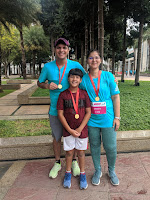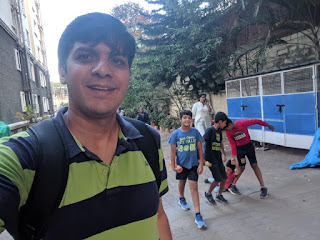"Tumhe aise kitne din yaad hai Roy, Your first job, pehla suit, pehli salary? Jab tumne ek ladki ko pehli baar chooa, pehli baar chooma? Jab pehli baar tumhara dil dhadka. 30 saal ki Zindagi mein aise kitne din hain jo tumhe yaad hain - 1, 2, 3 , 5 , 10 , 15, 30… 30 din hain na? 30 saal ki zindagi aur bas 30 din... baaki ke dino ka kya hua Roy?"
Source: http://hindimoviedialogues.blogspot.com/2009/04/bluffmaster-dialogues.html?m=1
In summary, what Boman was relaying to Abhishek Bachchan is that no matter how long we live, we manage to construct only a few moments that are truly memorable and worth living. The rest of life serves a purpose that's likely not indelible.
The assertion made in this dialogue is not hard to validate. If, for a moment, you take a rare-view mirror glance at your own life, you can really count such moments on your finger tips.
Last Sunday, I had one such moment. Let me first share a picture before I attempt to describe it.
This is a picture of me running with my son at Citrix Charity Run on 15th-Sept-2019. Citrix organizes this run in support of charities since last many years. Participating in this run has almost been like a yearly ritual. But this year was special for me.
 |
| My family |
Looking back, It was not just the fact that these kids completed 10 Km distance but it was a lot to do with the way they prepared.
The preparation for their run started on 2nd-Sept. We clearly had very less days as we slacked off in the last few weeks. I followed these principles in training the kids:
1. Since all of them were participating in a long distance run for the first time, I asked them on how they felt everyday before deciding on how many Km to run.
2. In practice, the focus was to finish the run, not target any superior timings.
3. Include appropriate rest and recovery in-between.
4. Mandatorily stretch after the practice run was over.
5. Run initial few Km using more leg power. Run last few Km using more mind power.
6. Make them aware of the race day situation, track etc.
7. Focus on hydration and diet, not only during the run day but also during practice runs.
8. Learning how to have fun while running, especially when going gets tough.
9. Learning how to draw energy from others and giving energy to each other.
 |
| Fun during Practice Runs |
 |
| Helping each other stretching post the run |
"How much do we run today ?", "What is the plan for tomorrow", "What should we eat", "How much water should we drink"- These were the questions i got asked every day during the course of build-up to the run. Needless to say, I was blow-away seeing their sincerity and commitment. Sincerity is such an underrated trait when we talk about the success defining qualities.
I will forever be grateful for this opportunity to create a stand-out memory. It took some effort but it also proved that memorable events can be manufactured in life if we just care enough to create them.
 |
| Training Plan that the kids tracked everyday |




